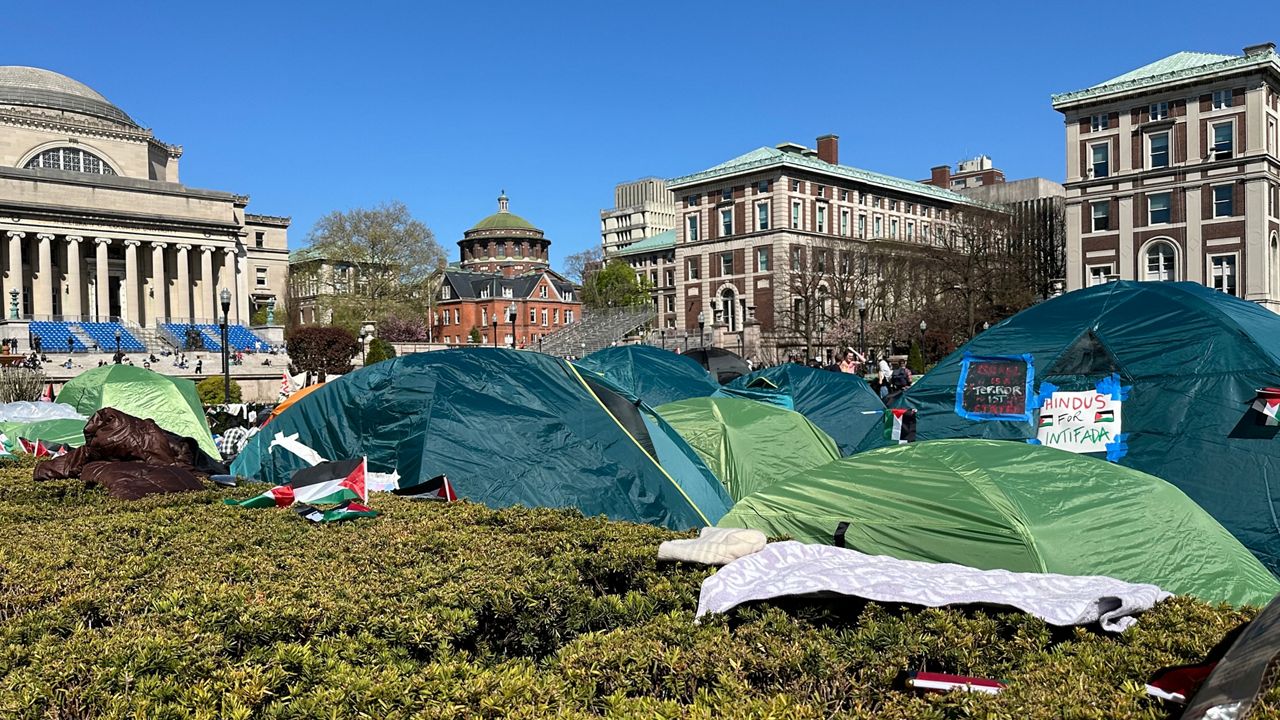A heavy police presence could be seen just off the campus grounds of Columbia University Monday afternoon as on-campus pro-Palestinian demonstrations continued into another day, while classes were being held remotely.
Columbia University President Minouche Shafik announced the decision for remote learning in a letter to members of the university community, saying the goal was to “deescalate the rancor and give us all a chance to consider next steps.
Protests began at the Ivy League school on Wednesday as Columbia’s president testified on Capitol Hill about antisemitism on college campuses.
Demonstrators occupied Columbia’s South Lawn for more than 30 hours, demanding the university divest funds from Israeli companies, namely those assisting with Israel’s war efforts.
Eventually, the university authorized the NYPD to break up the encampment.
NYPD officials said 108 people received summonses for trespassing on Thursday. Two of those individuals were additionally charged with obstruction of governmental administration, the NYPD said.
Tents were set up again on the campus on Sunday.
Some faculty members on campus on Monday said they did not agree with how the university administration handled the protest.
"I think it's been absolutely abhorrent. They've been treated very poorly, and we're trying to help rectify them," said Reinhold Martin, a professor at Columbia.
"I am dismayed at the president's willingness to use force against our students and have force used rather than coming down and talking to the students," said Susan Bernofsky, a professor at Columbia.
Columbia University is private property, and police are only allowed on campus when requested by the university or when a crime is being committed, NYPD officials said during a news conference Monday morning.
"We cannot just go on to Columbia campus as we see fit. It is up to university to decide whether or not they want us on campus," NYPD Deputy Commissioner of Legal Matters Michael Gerber said at a news briefing. "As a general matter, Columbia University - and this goes back many years - does not want NYPD present on campus. That is their decision. Last week on Thursday, they informed us that they had students who were trespassing. They asked us to come on to campus to take action and we did, but that was an exceptional case."
In the letter, Shafik said university deans, administrators and faculty members would continue to meet with student protesters and take actions “to enable us to peacefully complete the term and return to respectful engagement with each other.”
Claims of antisemitism at Columbia have escalated in recent days, with some Jewish and pro-Israel students saying they've been victims of hate speech and violence.
In her letter, Shafik said students “across an array of communities have conveyed fears for their safety,” and later added that there have been “too many examples of intimidating and harassing behavior on our campus” in the past few days.
“Antisemitic language, like any other language that is used to hurt and frighten people, is unacceptable and appropriate action will be taken,” Shafik said. “We urge those affected to report these incidents through university channels.”
Shafik also said that tensions were amplified by non-Columbia students who came to the campus to “pursue their own agendas.”
Columbia’s Students for Justice in Palestine — a coalition of more than 110 student groups calling for the university “to divest from apartheid and genocide” — released a statement Sunday night that read, in part, “We are frustrated by media distractions focusing on inflammatory individuals who do not represent us.”
“We firmly reject any form of hate or bigotry and stand vigilant against non-students attempting to disrupt the solidarity being forged among students—Palestinian, Muslim, Arab, Jewish, Black and Pro Palestinian classmates and colleagues who represent the full diversity of our country,” the statement read.
Gov. Kathy Hochul, in a post on X, formerly known as Twitter, said she met with the NYPD, a deputy mayor and Columbia’s president on Monday to discuss antisemitism and security on and around the campus amid the protests.
Several pro-Israel elected officials condemned those that they say are perpetuating antisemitism at a news conference on Monday.
"What we are seeing on these campuses is an absolute abomination," said Republican Rep. Mike Lawler, whose district covers parts of several New York counties located a few miles north of New York City.
"What we are seeing is not just an attack on Jews or an attack on Israel. It's an attack on democracy," said Republican Rep. Anthony D'Esposito, whose district covers parts of Nassau County on Long Island.
Rabbi Yuda Drizin, who runs the Chabad at Columbia, said many Jewish students told him they have been fearful on campus because of rhetoric used by some protesters. However, he said he believes Jewish students should show resiliency during this time, especially during Passover.
"We did not recommend students go home. This is not a time for students to turn away because of fear. And yes, there is reason to be fearful, but our minds and hearts and spirits have to be stronger than ever. And they are stronger than ever," he told NY1 before the holiday begins.
A protest and encampment popped up Monday at Gould Plaza near New York University’s business school.



